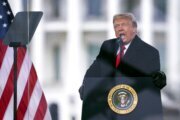While many national governments’ COVID-19 responses remain marred by disinformation and geopolitical squabbling — as recently as Aug. 10 President Donald Trump once again repeatedly referred to the “China virus” — new research comparing various countries’ levels of public awareness of the pandemic underscores the importance of a more harmonious global approach, according to the study’s authors.
“Our comparative study highlights the urgent need for international coordination to promote mutual learning” about the pandemic and effective measures against it, the researchers write. “Early release of official guidelines and timely clarification of rumors led by governments are necessary to guide the public to take rational action.”
The research was published on Aug. 3 as part of this month’s issue of the Journal of Medical Internet Research and performed by academics at universities in China, the United States and the United Kingdom.
National political leaders in China and the U.S., in particular, have often feuded over the spread of the virus while deflecting responsibility over surging local cases. Trump, along with frequently blaming China for having “instigated a global pandemic,” in July moved to withdraw the U.S. from the World Health Organization even as the agency confronts the largest global health emergency in decades, falsely alleging it helped China cover up its initial outbreak. Chinese officials, in turn, have floated unfounded conspiracy theories that the virus, which first appeared at a market in Wuhan, China, late last year, was actually spread by visiting United States Army members.
“The conspiracy theories are a new, low front in what they clearly perceive as a global competition over the narrative of this crisis,” Julian B. Gerwitz, an international affairs scholar at Harvard, told The New York Times this spring.
Researchers sought to measure and compare COVID-19 awareness and related behavior among the general public in 12 countries around the world, including China, Japan, France, Brazil, India, South Africa, the United Kingdom and the United States, from last December through April 11, after national governments had responded to the burgeoning pandemic. They monitored internet search and online purchasing data to assess each country’s “real-time” awareness of the outbreak, comparing the trends against each country’s reported case numbers. Internet search metrics are commonly used as a proxy for public attentiveness.
The results, they conclude, revealed “missed windows of opportunity” for countries to have better controlled the pandemic early on: Early this year, even as China’s outbreak spread and the World Health Organization declared a global emergency, the general public in other countries largely failed to notice. “Instead,” they write, “most countries and regions only responded to the epidemic after their own case counts increased.”
In late January, after China’s National Health Commission confirmed human-to-human commission, researchers found the Baidu search index, measuring internet activity in China, found a peak of more than 3 million searches for “coronavirus” on Jan. 25. At the same time worldwide Google searches on the topic rose slightly but then declined and “remained at a low level until late February, when COVID-19 started to spread in Italy.” Search volumes in India, Brazil and South Africa remained low until early March. “Even if there was a small increase in the public response to the epidemic in other countries, the index then quickly decreased and did not start to rise again until the epidemic spread to those countries.”
Researchers found that searches in a given country for items like “mask” and “hand sanitizer” also correlated with that country’s number of cases. Searches for chloroquine and hydroxychloroquine peaked on March 20, the day after Trump made misleading comments about the antimalarial drugs in a news conference.
Such misleading comments by countries’ leaders can pose risks by increasing public anxiety and skepticism, the researchers note. A poll released on Aug. 14 from NPR, PBS NewsHour and Marist showed 35% of Americans surveyed said they would not get a vaccine for the coronavirus once one is developed and approved.
“The risks and uncertainties of emerging infectious diseases may arouse public awareness and prompt either constructive behavior or disruptive behavior,” the study’s authors write. “COVID-19 has triggered the spread of rumors and misinformation through social media regarding unproven remedies, which has induced public stress and panic.”
More from U.S. News
Expert Warns Against Subsidizing Tourism to Help Struggling Economies
10 Countries With the Most Well-Developed Public Health Care Systems
The 25 Best Countries in the World
Countries Must Better Coordinate Actions to Fight Coronavirus, Study Shows originally appeared on usnews.com







